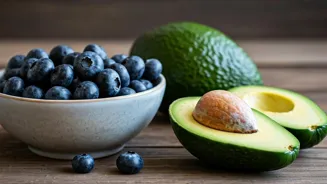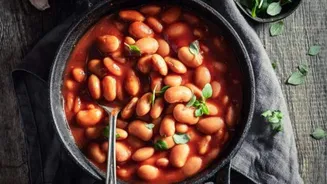Foods and Heart Health
High cholesterol is a significant concern for many, increasing the risk of heart-related issues. Cardiologists frequently advise lifestyle adjustments
to manage cholesterol levels, often recommending medications like statins. However, there are dietary interventions that can play a crucial role. Certain foods possess properties that can actively work to reduce LDL (low-density lipoprotein) cholesterol. LDL cholesterol, often called 'bad' cholesterol, is a primary contributor to the buildup of plaque in the arteries, which can lead to heart disease. Understanding the impact of food choices is vital for heart health; thus, making conscious decisions can contribute towards managing cholesterol and promoting overall well-being.
The Power of Oats
Oats are an excellent source of soluble fiber, particularly beta-glucan. When consumed, beta-glucan can bind to cholesterol in the digestive system, preventing its absorption into the bloodstream. This process facilitates the elimination of cholesterol from the body, lowering overall LDL levels. Regular oatmeal consumption has been linked to improvements in cholesterol profiles. Additionally, oats can offer other health benefits, such as better blood sugar control and promoting a feeling of fullness, aiding in weight management. This natural approach makes oats a valuable dietary tool for supporting heart health, and provides a simple yet effective strategy for those seeking to manage their cholesterol levels through food choices.
The Benefits of Nuts
Nuts, specifically those rich in unsaturated fats, like almonds and walnuts, can also positively influence cholesterol levels. These fats can replace saturated fats in the diet, which contribute to increased LDL cholesterol. Studies have shown that including nuts as part of a heart-healthy diet can help to lower LDL levels and reduce the risk of cardiovascular diseases. In addition to lowering cholesterol, nuts provide essential nutrients such as vitamins, minerals, and antioxidants, which are beneficial for overall health. The fiber content also contributes to better digestive health. It’s important to note that nuts are calorie-dense, so portion control is essential, but integrating nuts into your diet can provide both cholesterol management and additional health advantages.
Dietary Integration Tips
Incorporating oats and nuts into your diet is straightforward and versatile. Oats can be enjoyed as a warm breakfast with toppings like fruits and a sprinkle of nuts, or used in baking for added fiber. Nuts can be consumed as a snack, added to salads, or included in meals. However, it’s important to consider the preparation methods of these foods. Opt for minimally processed oats and choose unsalted nuts to maximize the health benefits. Pay attention to serving sizes to ensure calorie intake is controlled while still getting the full benefits. Consult a healthcare professional or a registered dietitian to tailor your diet to your specific needs and health conditions to ensure effective and safe cholesterol management strategies.
Beyond Food Choices
While dietary changes are vital, they are most effective when integrated with other lifestyle modifications. Regular physical activity helps improve cholesterol levels, control weight, and promote overall heart health. Avoiding smoking and limiting alcohol consumption also contribute to cardiovascular well-being. It is also recommended that you regularly check your cholesterol levels with a doctor to monitor the effectiveness of your dietary changes and overall heart health. Regular check-ups and screenings can help detect potential problems early, allowing for prompt intervention and reducing the risk of serious complications. A holistic approach, incorporating diet, exercise, and other healthy habits, forms the most comprehensive strategy for heart health and overall longevity.
















